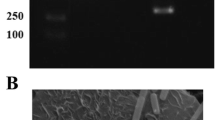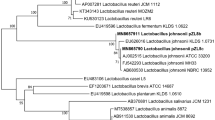Abstract
This study evaluated the safety of Lactobacillus johnsonii IDCC 9203 and investigated its anti-inflammatory activity in lipopolysaccharide (LPS)-induced RAW 264.7 macrophages. Genomic analysis revealed that this strain has no virulence and antibiotic resistance gene except tetW, which is a tetracycline resistance gene. Minimum inhibitory concentration data showed that the strain is resistant to tetracycline and aminoglycosides. Further analysis indicated that the transferability of the tetW gene is extremely low, and resistance to aminoglycosides is due to the intrinsic resistance of L. johnsonii IDCC 9203. Phenotypic safety assessment showed that the strain has neither β-hemolytic nor β-glucuronidase activity, and no biogenic amine production. When LPS-induced RAW 264.7 cells were treated with L. johnsonii IDCC 9203, the level of nitric oxide and expression of pro-inflammatory cytokines significantly decreased (p < 0.05). Therefore, L. johnsonii IDCC 9203 strain is considered as safe and beneficial probiotic for human consumption.



Similar content being viewed by others
Data availability and materials
The datasets generated during and/or analyzed during the current study are available from the corresponding author on reasonable request.
References
Abriouel H, Perez-Montoro B, Casado-Munoz MC, Knapp CW, Galvez A, Benomar N (2017) In silico genomic insights into aspects of food safety and defense mechanisms of a potentially probiotic Lactobacillus pentosus MP-10 isolated from brines of naturally fermented Alorena green table olives. PLoS ONE 12:e0176801
Allain T, Chaouch S, Thomas M, Vallée I, Buret AG, Langella P, Grellier P, Polack B, Bermúdez-Humarán LG, Florent I (2018) Bile-salt-hydrolases from the probiotic strain Lactobacillus johnsonii La1 mediate anti-giardial activity in vitro and in vivo. Front Microbiol 8:2707
Arndt D, Grant J, Marcu A, Sajed T, Pon A, Liang Y, Wishart DS (2016) PHASTER: a better, faster version of the PHAST phage search tool. Nucleic Acids Res 44:16–21
Biagioli M, Laghi L, Carino A, Cipriani S, Distrutti E, Marchianò S, Parolin C, Scarpelli P, Vitali B, Fiorucci S (2017) Metabolic variability of a multispecies probiotic preparation impacts on the anti-inflammatory activity. Front Pharmacol 8:505
Byakika S, Mukisa IM, Byaruhanga YB, Muyanja C (2019) A review of criteria and methods for evaluating the probiotic potential of microorganisms. Food Rev Int 35:427–466
Castro-Lopez C, García HS, Martínez-Avila GCG, Gonzalez-Cordova AF, Vallejo-Cordoba B, Hernandez-Mendoza A (2021) Genomics-based approaches to identify and predict the health-promoting and safety activities of promising probiotic strains – A probiogenomics review. Trends Food Sci Technol 108:148–163. https://doi.org/10.1016/j.tifs.2020.12.017
Chen L, Yang J, Yu J, Yao Z, Sun L, Shen Y, ** Q (2005) VFDB: a reference database for bacterial virulence factors. Nucl Acids Res 33:325–328
Davoren MJ, Liu J, Castellanos J, Rodríguez-Malavé NI, Schiestl RH (2019) A novel probiotic, Lactobacillus johnsonii 456, resists acid and can persist in the human gut beyond the initial ingestion period. Gut Microbes 10:458–480
Devi SM, Kurrey NK, Halami PM (2018) In vitro anti-inflammatory activity among probiotic Lactobacillus species isolated from fermented foods. J Funct Foods 47:19–27
DiMarzio M, Rusconi B, Yennawar NH, Ep**er M, Patterson AD, Dudley EG (2017) Identification of a mouse Lactobacillus johnsonii strain with deconjugase activity against the FXR antagonist T-β-MCA. PLoS ONE 12(9):e0183564
EFSA (2018) Guidance on the characterization of microorganisms used as feed additives or as production organisms. EFSA J 16(3):5206
FAO/WHO (2002) Guidelines for the evaluation of probiotics in food. Report of a Joint FAO/WHO Working Group on Drafting Guidelines for the Evaluation of Probiotics in Food. London Ontario, Canada. https://www.mhlw.go.jp/file/05-Shingikai-11121000-Iyakushokuhinkyoku-Soumuka/0000197343.pdf. Accessed 10 July 2022
Hu SS, Bradsh aw HB, Ch en JS, Tan B, Walker JM, (2008) Prostaglandin E 2 glycerol ester, an endogenous COX-2 metabolite of 2-arachidonoylglycerol, induces hyperalgesia and modulates NFκB activity. Br J Pharmacol 153:1538–1549
Jahan M, Zhanel GG, Sparling R, Holley RA (2015) Horizontal transfer of antibiotic resistance from Enterococcus faecium of fermented meat origin to clinical isolates of E. faecium and Enterococcus faecalis. Int J Food Microbiol 199:78–85
Je IG, Lee DG, Jeong DG, Hong D, Yoon JM, Moon JS, Park S (2018) The probiotic, ID-JPL934, attenuates dextransulfate sodium-induced colitis in mice through inhibition of proinflammatory cytokines expression. J Med Food 21:858–865
Kim SB, Kang BH, Kwon HS, Kang JH (2011) Antiinflammatory and antiallergic activity of fermented turmeric by Lactobacillus johnsonii IDCC 9203. Korean J Microbiol Biotechnol 39:266–273
Kim T, Lee B, Kwon H, Moon JS, Choi SK (2019) Complete genome sequence of probiotic Lactobacillus johnsonii IDCC9203 isolated from infant feces. Korean J Microbiol 55:432–435
Lee SH, Yang EH, Kwon HS, Kang JH, Kang BH (2008) Potential Probiotic Properties of Lactobacillus johnsonii IDCC 9203 Isolated from Infant Feces. Korean J Microbiol Biotechnol 36:121–127
Li T, Teng D, Mao R, Hao Y, Wang X, Wang J (2020) A critical review of antibiotic resistance in probiotic bacteria. Food Res Int 136:109571
Liu B, Pop M (2009) ARDB-antibiotic resistance genes database. Nucleic Acids Res 37:443–447
Maresca D, Zotta T, Mauriello G (2018) Adaptation to aerobic environment of Lactobacillus johnsonii/gasseri strains. Front Microbiol 9:157
McArthur AG, Waglechner N, Nizam F, Yan A, Azad MA, Baylay AJ, Kalan L (2013) The comprehensive antibiotic resistance database. Antimicrob Agents Chemother 57:3348–3357
OECD (2008) Test No. 425: acute oral toxicity: up-and-down procedure. OECD Guidelines for the Testing of Chemicals, Section 4, Part 425. OECD Publishing, Paris
Polit A, Yang HY, Amund D (2018) Investigating the transmissibility of tet(W) in bifidobacteria exposed to acid and bile stress. Biosci Microbiota Food Health 37:39–43
Qureshi N, Gu Q, Li P (2020) Whole genome sequence analysis and in vitro probiotic characteristics of a Lactobacillus strain Lactobacillus paracasei ZFM54. J Appl Microbiol 129:422–433
Rozman V, Lorbeg PM, Accetto T, Matijasic BB (2020) Characterization of antimicrobial resistance in lactobacilli and bifidobacteria used as probiotics or starter cultures based on integration of phenotypic and in silico data. Int J Food Microbiol 314:108388
Spano G, Russo P, Lonvaud-Funel A, Lucas P, Alexandre H (2010) Biogenic amines in fermented foods. Eur J Clin Nutr 64:95–100
Suzzi G, Torriani S (2015) Editorial: Biogenic amines in foods. Front Microbiol 6:472
Tarrah A, Pakroo S, Corich V, Giacomini A (2020) Whole-genome sequence and comparative genome analysis of Lactobacillus paracasei DTA93, a promising probiotic lactic acid bacterium. Arch Microbiol 202:1997–2003
Wu X, Zhao C, Guo Z, Hao Y, Li J, Shi H, Sun Y (2016) Genome sequence of Lactobacillus johnsonii strain W1, isolated from mice. Genome Announc 4:e00561-e616
Yan F, Polk DB (2020) Probiotics and probiotic-derived functional factors—mechanistic insights into applications for intestinal homeostasis. Front Immunol 11:1428. https://doi.org/10.3389/fimmu.2020.01428
Yu H, Lee N, Choi A, Choe J, Bae CH, Paik H (2019) Anti-inflammatory potential of probiotic strain Weissella cibaria JW15 isolated from kimchi through regulation of NF-κB and MAPKs pathways in LPS-induced RAW 264 7 cells. J Microbiol Biotechnol 29(7):1022–1032
Zhang W, Wang J, Zhang D, Liu H, Wang S, Wang Y, Ji H (2019) Complete genome sequencing and comparative genome characterization of Lactobacillus johnsonii ZLJ010, a potential probiotic with health-promoting properties. Front Genet 10:812
Funding
This work was supported by the National Research Foundation of Korea grant funded by the Korean government (Ministry of Science and ICT, MSIT; grant no. 2020R1C1C1005251), and Korea Institute of Planning and Evaluation for Technology in Food, Agriculture and Forestry (IPET) through High Value-added Food Technology Development Program, funded by Ministry of Agriculture, Food and Rural Affairs (MAFRA) (321033–3).
Author information
Authors and Affiliations
Contributions
OEA conducted statistical analysis, interpreted the data, and wrote the draft manuscript. SAC performed experiment, conducted statistical analysis, and interpreted the data. OB, WYB, HK, and HJJ performed part of the experiment. CEC reviewed and revised the draft manuscript. JY and YHJ conceived the idea, acquired fund, supervised the project, reviewed, and revised the manuscript. All authors read and approved the final manuscript.
Corresponding authors
Ethics declarations
Competing interests
The authors declare no conflict of interest.
Ethical approval
Animal studies were conducted at the Korea Testing and Research Institute (KTRI; Hwasun-gun, Jeollanam-do, Korea) under the Animal Protection Act (no. 14651) and Laboratory Animal Act (no. 15278) of the Korean government.
Additional information
Communicated by Erko Stackebrandt.
Publisher's Note
Springer Nature remains neutral with regard to jurisdictional claims in published maps and institutional affiliations.
Supplementary Information
Below is the link to the electronic supplementary material.
Rights and permissions
About this article
Cite this article
Adedeji, O.E., Chae, S.A., Ban, OH. et al. Safety evaluation and anti-inflammatory activity of Lactobacillus johnsonii IDCC 9203 isolated from feces of breast-fed infants. Arch Microbiol 204, 470 (2022). https://doi.org/10.1007/s00203-022-03097-0
Received:
Revised:
Accepted:
Published:
DOI: https://doi.org/10.1007/s00203-022-03097-0




